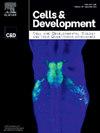由母体肥胖引起的发育程序以饮食和性别特异性的方式改变后代的寿命和免疫反应。
IF 2
4区 生物学
Q4 Biochemistry, Genetics and Molecular Biology
引用次数: 0
摘要
母亲肥胖是一个日益严重的健康问题,它使后代易患代谢功能障碍、免疫系统改变和神经退行性疾病。为了研究母体肥胖的代际影响,我们在交配前使用了暴露于高糖(HSD)和高脂肪饮食(HFD)的黑腹果蝇。我们发现,母亲饮食引起的肥胖以性别和饮食特异性的方式显著改变了后代的寿命、免疫反应和神经元健康。雄性后代尤其易受影响,表现出寿命缩短,攀爬能力受损,轴突变性增加,特别是在母体接触HFD后。转录组学分析揭示了年龄依赖性和饮食特异性的变化,雄性在50 日龄时表现出明显的变化。血细胞(血样细胞)的发育编程在这些结果中起着至关重要的作用,因为血细胞中关键免疫途径(如津津和upd3)的敲低进一步以饮食特异性方式影响寿命。这些发现强调了母体饮食和免疫功能之间复杂的相互作用,强调了母体肥胖诱导的印记对免疫细胞的影响以及随后的长期健康后果。我们的研究为将母体代谢健康与后代结局联系起来的保守机制提供了新的见解,并强调了继续需要动物模型来理解代际健康影响。本文章由计算机程序翻译,如有差异,请以英文原文为准。
Developmental programming by maternal obesity alters offspring lifespan and immune responses in a diet- and sex-specific manner
Maternal obesity is a growing health concern that predisposes offspring to metabolic dysfunction, immune system alterations, and neurodegenerative disorders. To investigate the intergenerational effects of maternal obesity, we used Drosophila melanogaster exposed to high-sugar (HSD) and high-fat diets (HFD) before mating. We found that maternal diet-induced obesity significantly altered offspring lifespan, immune responses, and neuronal health in a sex- and diet-specific manner. Male offspring were particularly susceptible, exhibiting reduced lifespan, impaired climbing ability, and increased axonal degeneration, especially following maternal HFD exposure. Transcriptomic analyses revealed age-dependent and diet-specific changes, with males showing pronounced alterations at 50 days of age. Developmental programming of hemocytes (blood-like cells) played a crucial role in these outcomes, as knockdown of key immune pathways such as Relish and upd3 in hemocytes further influenced lifespan in a diet-specific manner. These findings highlight the complex interplay between maternal diet and immune function, underscoring the impact of maternal obesity-induced imprinting on immune cells and subsequent long-term health consequences. Our study provides new insights into conserved mechanisms linking maternal metabolic health to offspring outcomes and emphasizes the continued need for animal models to understand intergenerational health impacts.
求助全文
通过发布文献求助,成功后即可免费获取论文全文。
去求助
来源期刊

Cells and Development
Biochemistry, Genetics and Molecular Biology-Developmental Biology
CiteScore
2.90
自引率
0.00%
发文量
33
审稿时长
41 days
 求助内容:
求助内容: 应助结果提醒方式:
应助结果提醒方式:


